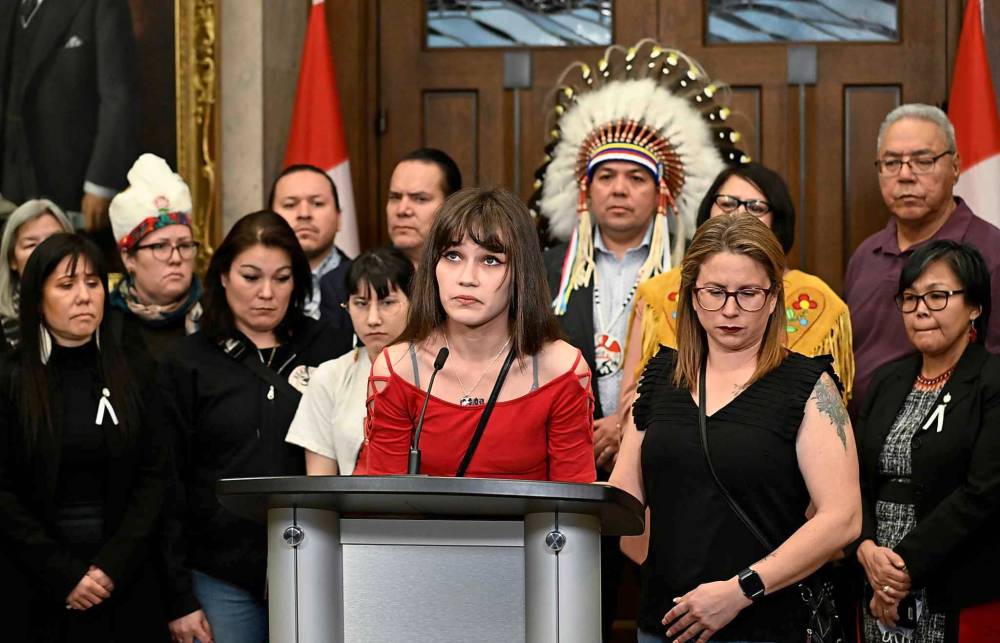Why do Indigenous women have to beg the rest of Canada for dignity and justice?
Advertisement
Read this article for free:
or
Already have an account? Log in here »
To continue reading, please subscribe:
Monthly Digital Subscription
$0 for the first 4 weeks*
- Enjoy unlimited reading on winnipegfreepress.com
- Read the E-Edition, our digital replica newspaper
- Access News Break, our award-winning app
- Play interactive puzzles
*No charge for 4 weeks then price increases to the regular rate of $19.00 plus GST every four weeks. Offer available to new and qualified returning subscribers only. Cancel any time.
Monthly Digital Subscription
$4.75/week*
- Enjoy unlimited reading on winnipegfreepress.com
- Read the E-Edition, our digital replica newspaper
- Access News Break, our award-winning app
- Play interactive puzzles
*Billed as $19 plus GST every four weeks. Cancel any time.
To continue reading, please subscribe:
Add Free Press access to your Brandon Sun subscription for only an additional
$1 for the first 4 weeks*
*Your next subscription payment will increase by $1.00 and you will be charged $16.99 plus GST for four weeks. After four weeks, your payment will increase to $23.99 plus GST every four weeks.
Read unlimited articles for free today:
or
Already have an account? Log in here »
Hey there, time traveller!
This article was published 09/12/2022 (1094 days ago), so information in it may no longer be current.
I opened Twitter the other day and saw a video clip of Cambria Harris speaking.
She is the daughter of Morgan Harris, believed to be one of alleged serial killer Jeremy Skibicki’s victims. Skibicki has been charged with first-degree murder in her slaying and those of three other Indigenous women — Rebecca Contois, Mercedes Myran and the unidentified Mashkode Bizhiki’ikwe (Buffalo Woman).
Cambria Harris was speaking at a news conference in Ottawa Thursday, where she travelled with her sister Kera to demand action from the federal government to address missing and murdered Indigenous women, girls and two-spirit people. She was surrounded by several First Nations leaders and advocacy groups when she recounted how the previous night, she’d been briefed by Winnipeg police. It was through a PowerPoint presentation that they told her they believed her mother and Myran’s remains were in the Prairie Green Landfill, but that they would not be searching the site because it wasn’t feasible.

Cambria Harris, daughter of Morgan Harris, speaks during a news conference in the foyer of the House of Commons on, on Dec. 6. (Justin Tang / The Canadian Press files)
“Time and time again, our Indigenous women and brothers and sisters have to come here, and we have to shout, and we have to raise our voices begging for change, and begging for justice for our people, and that is wrong,” she said.
“I should not have to stand here today, and I should not have to come here and be so mad and beg and beg so that you will find our loved ones and bring them home.”
Harris spoke eloquently, with a vulnerable ferocity, through her grief. She minced no words, as she demanded help regarding the ongoing human-rights crisis in Winnipeg — a place that Carolyn Bennett, the former federal minister of Crown-Indigenous relations, has called “ground zero” in terms of missing and murdered Indigenous women.
I cannot stop thinking about that video clip.
I cannot stop thinking about the young women who had to stand on a national stage in the darkest moments of their lives to beg for help from the systems that have failed them. I cannot stop thinking about how many times I’ve seen other families make similar pleas amidst unwavering sorrow.
Why do we have to beg for dignity? Why does the only currency for action seem to be the anguish and tears of Indigenous women and a collective public outcry before anything is done?
I am an Indigenous woman with a platform. It is my responsibility to use my voice and my words on behalf of my relatives, especially when they are hurting. I am so angry, and I stand with the Harris sisters and all the families before them in their calls for justice and action.
We can’t dress this issue up in a T-shirt or wrap it in a land acknowledgement and expect that it will just go away. We need to move far past the surface stuff, into the hard and uncomfortable task of changing systemic issues and addressing this genocide.
The final report of the National Inquiry into Missing and Murdered Indigenous Women and Girls outlines 231 calls for justice that need to be taken by governments, agencies and every single Canadian in order to end this genocide.
“Let’s be clear, these crimes are part of the genocide that was declared in 2019 by the National Inquiry into Missing and Murdered Indigenous Women and Girls,” the Native Women’s Association of Canada said in a Dec. 2 news release on the alleged serial murders.
“The government offered a national action plan in response to that report which lacked any devoted funding, timelines or measurable goals. And a report card released last spring by the Native Women’s Association of Canada found, predictably, little progress had been achieved.”
Indigenous women deserve better.
shelley.cook@freepress.mb.ca
Twitter: @ShelleyACook

Our newsroom depends on a growing audience of readers to power our journalism. If you are not a paid reader, please consider becoming a subscriber.
Our newsroom depends on its audience of readers to power our journalism. Thank you for your support.
History
Updated on Friday, December 9, 2022 6:44 PM CST: Adds related posts.









